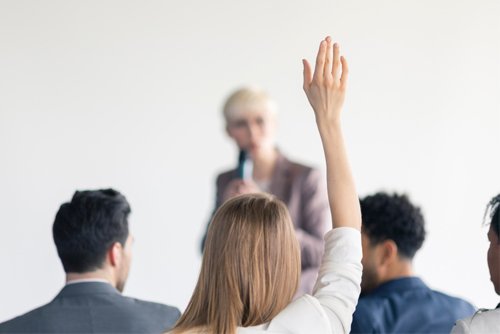


Marie Boland, Chief Executive Officer at Safe Work Australia, explains how it's fundamentally important for leaders to take a risk management approach with their workforce to stay ahead of potential psychological safety risks emerging in this frequently asked question because if they are doing that well and taking a consultative approach with their staff, they will identify hazards and address them regardless of if it is written in a code or not. Listen to Marie's full episode here.
Marie Boland, Chief Executive Officer at Safe Work Australia, explains how it's fundamentally important for leaders to take a risk management approach with their workforce to stay ahead of potential psychological safety risks emerging in this frequently asked question because if they are doing that well and taking a consultative approach with their staff, they will identify hazards and address them regardless of if it is written in a code or not. Listen to Marie's full episode here.
Listen in as Marie Boland, Chief Executive Officer at Safe Work Australia, explains why work design is the first stepping stone in the prevention of both physical and psychological hazards in the workplace in this frequently asked question because it's at this point that leaders have the opportunity to identify and eliminate potential hazards at the point of designing how work is done. Listen to Marie's full episode here.
It's fundamental that leaders constantly talk to their staff and keep up-to-date with what's going on in their organisation. They also need to monitor statistics, red flags, and other signals and quickly get on top of them regarding psychological risks to their workforce. Marie Boland, Chief Executive Officer at Safe Work Australia, explains how the approach to dealing with psychosocial hazards in the workplace is no different from the approach you would take in regards to physical risks, but often where the complexity comes in for psychosocial risks is the controls relating to work design, staffing and resources, where work, health, and safety than crosses over with human resources and industrial relations. Marie's full episode is available here.
There has been a significant increase in reported mental health workplace injuries in Australia over the past few years. Marie Boland, Chief Executive Officer at Safe Work Australia, explains some of the reasons behind this in this frequently asked question, which include how the conversations have changed and matured with the stigma around mental health being removed, how there is increasing acknowledgment that workplace injuries do include psychological injuries, and how the architecture in the laws now better supports these conversations with both workers and employers knowing their rights and obligations. Listen to Marie's full episode here.
There are many important initiatives around mental health in the workplace, including mentally healthy workplace toolkits, guides, wellbeing vouchers, and even R U OK day. Erma Ranieri, Commissioner for Public Sector Employment in South Australia, shares her perspectives on how leaders must keep in touch with this regularly. It may just be one day when they are not ok, or even the tone they reply with that gives you an indication that they might need help or support. With psychosocial hazards embedded in legislation, leaders must have a stronger commitment to this. Listen to her episode here
We are all touched by mental health at some point in our lives. Erma Ranieri, Commissioner for Public Sector Employment for South Australia, shares her perspectives on the importance of providing leaders with more insights in their released Conversations Matters guide, which helps leaders understand and see their staff as human beings who have things happening in their lives that may be affecting how they show up at work, and how they can have these discussions and offer the right help and support to their employees. Listen to her episode here
As a passionate advocate for mental health, Cherie Canning provides the essential steps all organisational leaders can take to support their employees' mental health. Tune in as Cherie also provides examples of wellness areas and initiatives that her clients have developed to help support the health of their teams. As part of our podcast series on organisational health and the seven dimensions of wellness, the entire episode on workplace culture is available to listen to here.
Leadership can be one of the critical determinants of a toxic workplace culture, and often, new leaders inherit a toxic culture. Listen to Cherie Canning, Founder and Director of Luminate Leadership, as she describes how leaders can turn a toxic culture around and provides examples of how leaders have done just that. As part of our podcast series on organisational health and the seven dimensions of wellness, the entire episode on workplace culture is available to listen to here.
As Cherie Canning from Luminate Leadership explained previously in our podcast series on organisational health and the seven dimensions of wellness, for leaders to create a people-centric culture, it starts with psychological safety. Listen in as Cherie explains the four stages of psychological safety and how these play out in practice: inclusion safety, learner safety, contribution safety, and challenge safety. You can also listen to the full podcast episode here.